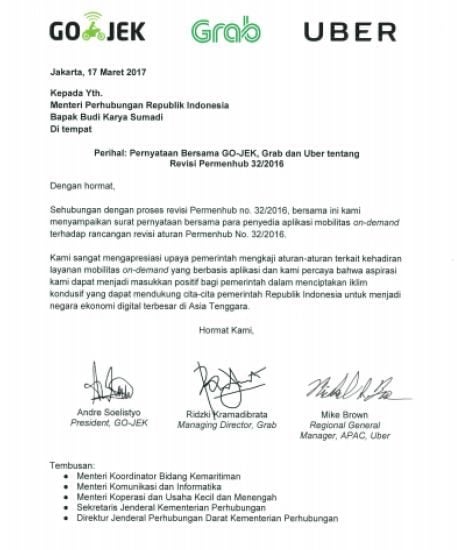On Friday, major ride-hailing startups in Indonesia –Go-Jek, Grab, and Uber– formed an unlikely coalition to fight against the government’s latest revision in transportation regulation

I am going to start this op-ed with a confession: I am sick of writing about the ride-hailing startup drama in Indonesia.
If only you’d see me dozing off every-time there is “breaking news” of yet another protest by drivers of conventional public transportation that eventually led to a Go-Jek driver being punched. This is inevitably followed by a GrabBike driver punching an angkot driver (you know, to show solidarity with his peers). Then it all becomes a bloody tangled mess and some people get arrested.
It is so typical.
Also typical is how the Indonesian government changes their mind more often than … the Indonesian government changing their mind.
I have come to the point that whenever such things happen, I would ask our editors, do we have to publish this again? And I can’t tell you how relieved I am to find them replying, let’s just publish something when there is an important update.
And important update is what we finally got last week.
Also Read: Former Go-Jek VP launches BINAR tech academy in Jogjakarta, plans 3 branches in 2017
An important update
After a period of quiet, recently there have been waves of marches by mini-bus drivers in cities across the country, followed by announcements by local governments in places such as Jogjakarta to ban ride-hailing services completely. Despite promises from the government to allow ride-hailing startups to operate legally, local authorities were beginning to outlaw the ride-hailing industry.
Earlier this month, the Ministry of Transportation announced 11 new points that will be included in the revision of Ministry of Transportation Regulation No. 32/2016 (the law that regulates the operation of land transportation).
The regulation obliges ride-hailing startups to follow a set of regulations that include tariff, fleet quota, taxation, and periodical feasibility tests.
This was enough, the ride-hailing startups were done playing nice.
On Friday, at Grab’s office in Jakarta, the three major players (Grab, Go-jek and Uber) released a joint statement responding to the upcoming revision, which is set to be formalised on April 1.
The points of the statement are:
- Acknowledging the importance of a periodical feasibility test (KIR) and calling for the government to provide the facilities needed to perform the tests, including a special queue line for drivers of the ride-hailing startups.
- Objection to the proposed quota of driver-partners each startup is allowed to employ, citing market demands and the right to livelihood as the main reasons behind the rejection.
- Objection to the proposal of determined minimum and maximum tariff for each journey with vehicles using Go-Jek, Grab, and Uber apps.
- Rejection to the proposal that obliges driver-partners to register their vehicles as a property of a co-operation or union, despite earlier claims that driver-partners will be allowed to maintain ownership of their personal vehicles.
The ride-hailing startups also called for the government to give them a nine-month-long grace period to ensure smooth transition for the companies.
Also Read: Grab launches R&D centres in Bangalore and Ho Chi Minh City, will add over 800 R&D jobs in 2 years

A copy of the joint statement issued by Go-Jek, Grab, and Uber. Addressed to Minister of Transportation Budi Karya Sumadi, it expressed the companies’ rejection for several points the Regulation No. 32/2016 revision
Readers, if there is ever a moment when we need to side with ride-hailing startups, this is definitely it.
Don’t get us wrong. Even as an online resource platform for tech startups in Asia, we do not always side with ride-hailing startups.
There are times when we question and criticise the movements that they make, such as when Go-Jek decided to release a new app for their lifestyle services, or when Grab was being vague about what Badrodin Haiti is actually doing in the company. Don’t get us even started on Uber and its international-level drama.
Despite having benefited from unbelievably low tariffs provided by these ride-hailing startups, as a user, I too question whether it is wise for a company to subsidise its prices for so long.
But if you look at the points that the three companies are elaborating in their statement, some of them are a serious source of concern, as they directly affect people who are not even part of the industry (yet).
The worst being the proposal to limit the number of driver-partners each startup can have.
Despite its own share of criticism, we must credit the sharing economy for its ability to provide an alternative way for the common people to make a living off an idle asset. Ask any aspiring Go-Jek, Grab, or Uber driver waiting in line at every open recruitment event. Ask these three companies why, instead of how, they managed to grow their business in Indonesia from only a handful of drivers to having a significant presence in most major cities.
It is not only because there is a demand from potential users. It is also because of a demand from potential driver-partners.
In the words of Grab Indonesia Managing Director Ridzki Kramadibrata, as reported by DailySocial, the proposal for the revision is “rife with nuance of protectionism” and will bring the transportation industry back to the “old, outdated ways” of running their business.
So what can us users do? Speak up. Get the word out on social media, tell your representatives in the parliament. Let it be known that this is something that will affect not only the companies, but also the regular people.
Tech has opened the ways for us to move forward, let us not look back.
—
Image Credit: Tawng / 123RF Stock Photo
The post As users of ride-hailing startups in Indonesia, this is our battle appeared first on e27.